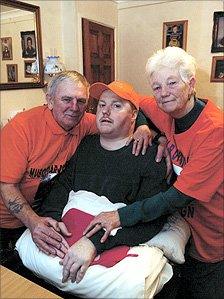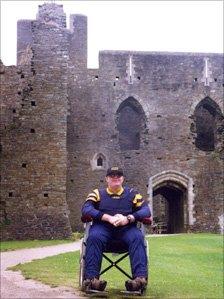AMs' report highlights gaps in muscular dystrophy care
- Published

Ray and Margaret Thomas in the last photo taken with their son Leighton
A report by a group of assembly members has highlighted serious gaps in the care of people who suffer from muscle wasting diseases.
The cross-party group for muscular dystrophy argues that an extra £470,000 should be invested for the estimated 3,400 people in Wales who have one of the more than 60 different types of muscular dystrophy and related neuromuscular conditions.
It says that it would, in turn, save the Welsh NHS nearly £4m a year in emergency hospital admissions.
The research has been backed by families affected by muscular dystrophy including Ray Thomas from Neath, who lost two sons to muscular dystrophy, and after whom the report is named.
The AMs report followed a nine-month inquiry and is due to be presented to Health Minister Edwina Hart later.
Giving evidence to the group, Mr Thomas said his son, Leighton, 43, who died in March from Becker muscular dystrophy, was failed by the NHS.
Six years before his brother, Robert, who was 39, died from the same condition, which affects only males.
Mr Thomas believes both his sons could have lived up to another 10 years if they had received the care they needed.
"Two weeks before Leighton died, I had to make a phone call to England to see if I could take my son to a specialist clinic," he said.
"By the time the answer came back, yes, Leighton had deteriorated. He couldn't make it.
"If we had the clinicians in Wales, for adults, I honestly believe that Robby's and Leighton's life could have been extended.
Leighton spent the last 11 years of life in a wheelchair. This Mr Thomas says was due to a lack of physiotherapy.
Chair Dai Lloyd AM said: "It was clear from the evidence gathered throughout the inquiry that specialist care can reduce emergency admissions.

Robert Thomas, who also had Becker muscular dystrophy, died in 2004
"Health boards in Wales must recognise this - by working together and sharing the costs of a neuromuscular service, the NHS can save money."
NHS Wales is pledged to hosting two care advisers, one in north and one in south Wales. Recruitment is under way but no-one is yet in post.
Nic Bungay, of the Muscular Dystrophy Campaign, said: "In January we were shocked by Ray's story of his son Leighton having spent 11 years without ever leaving his wheelchair.
"Now that story is all the more tragic because Leighton passed away without ever having seen the better care his parents are still fighting so hard for.
"We hope the health minister and NHS Wales will take notice of the huge inequality Welsh muscle disease patients are facing."